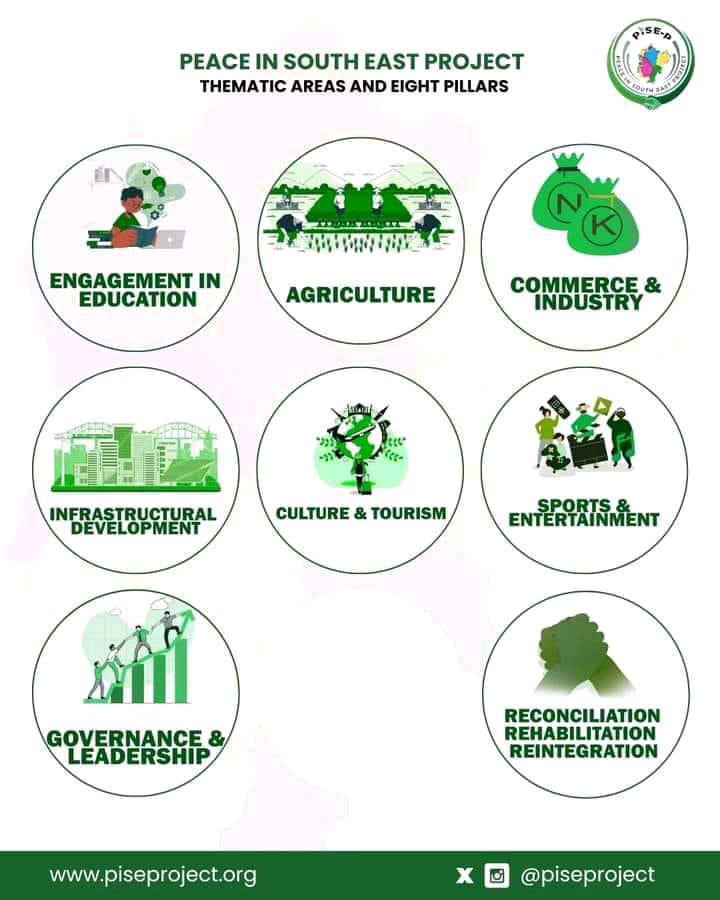The Nigeria-Biafra Civil War, which lasted from July 6, 1967, to January 15, 1970, ended with both sides agreeing to a “no victor, no vanquished” order. However, the traumatic memories and painful remnants of the conflict still haunt the Igbo people, particularly the families who lost loved ones and breadwinners during those 30 months of violence.
In the aftermath, the Indigenous People of Biafra (IPOB) emerged as a response to the failures of leadership and the Igbo people’s yearning for national reintegration and renewal. These aspirations stemmed from the oppressive behaviors and anti-people policies of previous governments, compounded by the silence of elites toward the widespread mistreatment of ordinary citizens by those in power. What began as a peaceful struggle turned violent when the then Chief of Army Staff launched Operation Python Dance across southeastern Nigeria, resulting in the cold-blooded murder of unarmed protesting youths, traumatizing their families and leaving them in mourning.
The conflict escalated significantly in the city of Orlu, Imo State, Nigeria, on January 16, 2021, when the Nigerian Army targeted the paramilitary wing of IPOB, the Eastern Security Network (ESN). Although the ESN initially repelled the army’s advance, IPOB eventually withdrew the ESN from Orlu to de-escalate the situation. Following a brief lull, Nigeria launched an offensive to destroy the ESN. On February 19, 2021, IPOB declared a state of war between Nigeria and Biafra.
In response, Biafran separatists began forging alliances with other groups in Nigeria and Cameroon. Despite these developments, they asserted that their militant actions were primarily focused on defending local communities from armed herders and bandits, rather than targeting the Nigerian government. In late June, IPOB leader Nnamdi Kanu was arrested by Interpol and extradited to Nigerian authorities. Yet, the injustices faced by the Igbo persisted in new forms. Nevertheless, the Igbo demonstrated resilience and continued to innovate, fostering a system that encourages creativity and harnesses transformative technology, turning challenges into opportunities across global communities.
By 2022, the situation in Ala Igbo reached a crisis point, marked by unprecedented armed conflict. Following the Civil War, the worst violence involved killings among the Igbo themselves, leading to mass murders, a surge in kidnapping, and a rise in other criminal activities. The region experienced horrific bloodshed, and the local economy suffered as investors withdrew for safety. Once-thriving communities became perilous, with footpaths turning into emergency burial sites. Silence enveloped the region; darkness descended where once there had been safety.

According to Interactionist theory, conflicts arise from a mix of inherent human tendencies and external societal factors. Similarly, John Burton’s Basic Human Needs Theory posits that conflicts occur when fundamental human needs—such as security, recognition, valued relationships, and control over one’s environment—are unmet or threatened.
From these theories arises the Conflict theory’s three core assumptions:
1. Humans are inherently self-interested.
2. Societies operate under a perpetual scarcity of resources.
3. Conflict is a pervasive and unavoidable aspect of social groups and their interactions.
Then emerged Benjamin Okezie Kalu, a new face of Igbo political leadership, who strives to navigate these complex issues. His emergence was not merely a stroke of political optimism; it was a deliberate act of conviction aimed at emancipating the Igbo people. Kalu initiated a village meeting within the region, intentionally creating a gathering of hope where dialogue met collaboration. This well-organized structure was designed to foster cooperation, console the aggrieved, and support the broken-hearted. He called it the Peace in South East Project (PISE-P). Through this project, Kalu mobilized leaders from all over Nigeria, breaking down religious sentiments, cultural barriers, and political affiliations. In truth, he brought together an unprecedented number of thought leaders in the historical landscape of Igbo society; it was as if the Igbos had convened a global town hall meeting, with Bende as the melting point of that peace.
The conversation began with a sincere call for help and partnership. This platform was established to combat the growing anti-Igbo syndrome affecting many of our brothers across the Niger. It was also designed to extend a hand of fellowship to our brothers on the other side of the river and offer amnesty to those brandishing arms and ammunition. At the same time, it provided pathways to a safer, more constructive life. Among the attendees were captains of industry, clerics, public officials, and traditional leaders from various ethnic backgrounds across the nation.
Kalu passionately recounted the long-neglected struggles of the Igcbo people, starting from the aftermath of the civil war to the enduring years of structural and sociopolitical neglect. He addressed each issue in depth, highlighting the resilience and creativity inherent in our culture. He told our story in a compelling yet respectful manner, speaking with an earnest tone that resonated with everyone in attendance. Kalu pleaded for a fair share in the Nigeria project, and the positive effects of his actions are beginning to manifest throughout the South East.
It is important to note that never before in history have such influential individuals gathered to discuss the well-being of the Igbo people. We cannot overlook this effort if we are sincere about our progress as a community. If we truly wish to advance, we must distance ourselves from violence and refrain from harboring rancor and bitterness. Kalu made the first call, and the nation responded with a language of love and genuine concern, leading to visible improvements across the region.
Since its inception, the project has launched various youth empowerment programs, infrastructural development initiatives, social interventions, and enhanced dialogue meetings between the aggrieved and political leaders in all five southeastern states. The once-struggling Igbo community is beginning to regain its vitality, and businesses are witnessing the potential for expansion. However, we have yet to eradicate the root causes of these conflicts. We remain committed to this goal. The government is aware of what still needs to be addressed. In the meantime, let’s continue to embrace one another while rejecting violence against innocent people and the needless bloodshed that has afflicted our region.
Bond Ike Udeagha, ANIPR
Abuja, Nigeria.